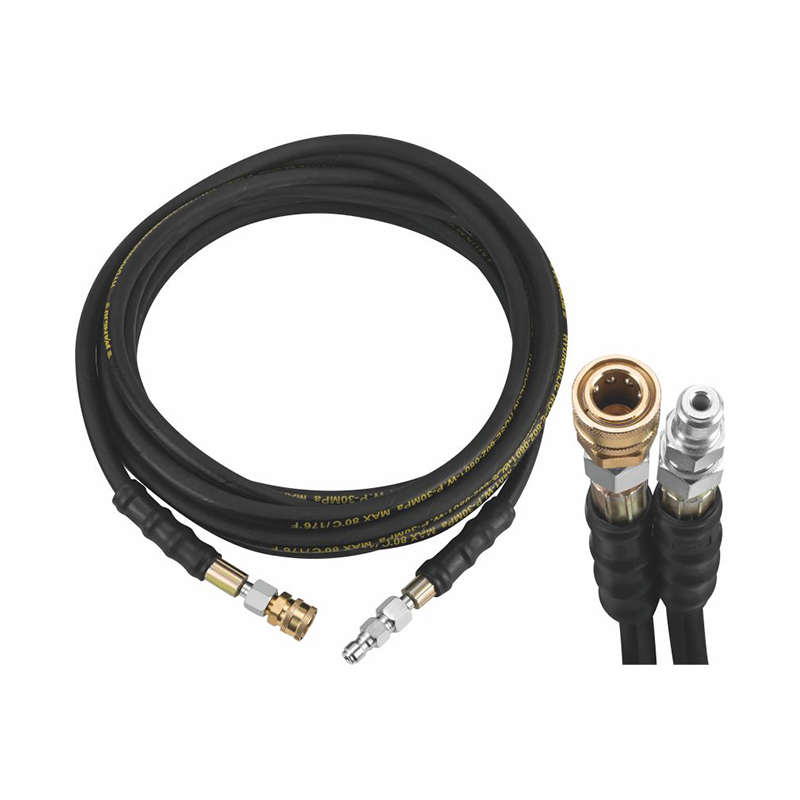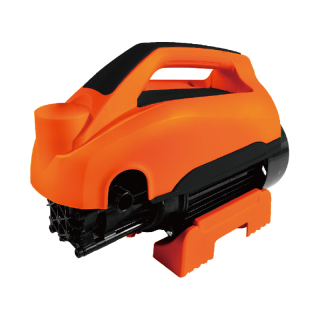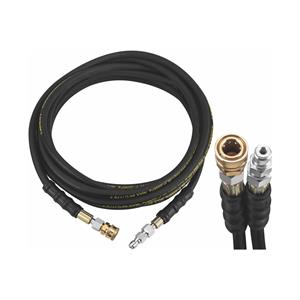Hydraulic hose is a kind of flexible piping used in hydraulic system, which is widely used in various industrial equipment and machinery. Depending on different needs and application scenarios, hydraulic hoses have different types and structures.
1.Structure
The hydraulic hose, as its name suggests, is mainly composed of a liquid-resistant inner rubber layer, a middle rubber layer, a steel wire winding reinforcement layer (the number of layers may vary, such as 2, 4, or 6 layers), and an outer rubber layer. The inner rubber layer is responsible for making the conveying medium under pressure and protecting the steel wire from erosion. The outer rubber layer, on the other hand, protects the steel wire from damage. The steel wire layer serves as the skeleton material and plays a crucial reinforcing role, ensuring the high pressure-bearing capacity of the hose.
2.Characteristics and performance
High pressure-bearing capacity is a hallmark of hydraulic hose, which can withstand high working pressures, with the highest pressure reaching up to 60MPa. In addition, the hose exhibits excellent pulse performance, performing well under pulse pressure and being suitable for occasions requiring frequent pressure changes. Resistant to oil, heat, and aging, the hose is made of special synthetic rubber, which enhances its durability. Furthermore, the hose body is tightly bonded and highly flexible, allowing for little deformation under pressure and making it easy to install and use. Its excellent resistance to bending and fatigue means that the hose can withstand multiple bending and fatigue tests, ensuring the reliability of long-term use.
3.Usage and application field
the hose is widely used in a variety of occasions that require liquid or gas transmission, especially in parts that require bending changes. Its versatility and high pressure-bearing capacity make the hose indispensable in multiple industries. the hose main application areas include:
Automobile industry: the hose is used in automobile brake systems, air-conditioning systems, and power steering systems.
Mechanical industry: the hose is commonly used in various types of machine tools, cranes, and other equipment in the field of machinery manufacturing, particularly in hydraulic systems that require robust and reliable hydraulic hose.
Energy industry:the hose plays a key role in the extraction and transportation of oil, natural gas, and other energy resources, where high pressure-bearing capacity is essential.
Other fields: also applies to engineering and construction, metallurgy and forging, mining equipment, ships, plastic injection molding machinery, agricultural machinery, and various industrial sectors of mechanization and automation of the hydraulic system.
4.Selection and installation considerations
When selecting a hydraulic hose, suitable hose, couplings, and hose assemblies should be chosen according to specific applications. Considerations include the type, size, length of the hose, system working pressure, type of fluid, and environment of use. It is crucial to match the right hose with the right application to ensure high pressure-bearing capacity and overall performance.
Correctly installed fittings are essential for the safety and proper functioning of the hose assembly. There are a variety of fittings for hose, and different fittings should be selected for different types of hose. Proper installation ensures that the hose remains intact and performs optimally under pressure.
Avoid damage to the hydraulic hose by handling and storing it with care. Dragging on sharp and rough surfaces should be avoided to prevent the hose from enduring bends and flattening. Additionally, pay attention to the operating temperature and pressure, ensuring that they do not exceed the hose's temperature resistance limit and specified working pressure to guarantee its service life and safety.














